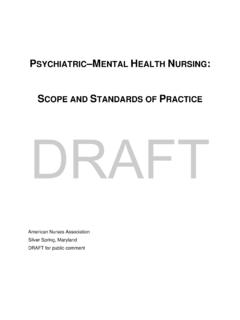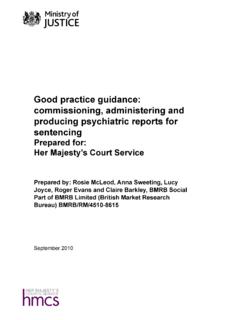Transcription of The role of the nurse practitioner in psychiatric/mental ...
1 Journal of psychiatric and Mental Health Nursing, 2006, 13, 78 84. The role of the nurse practitioner in psychiatric /mental health nursing: exploring consumer satisfaction 1 2. J . WO R T A N S R P N , B . H A P P E L L RN RPN BA(Hons) Dip Ed B Ed M Ed PhD &. 3. H. JOHNSTONE. 1. Project Officer, nurse practitioner Demonstration Project, Northern Area Mental Health Service, Epping, 2. Associate Professor/Director, Centre for psychiatric Nursing Research and Practice, School of Nursing, The 3. University of Melbourne, Carlton, Registered psychiatric nurse , Northern CAT Team, Northern Hospital, Epping, Australia Correspondence: WORTANS J., HAPPELL B. & JOHNSTONE H. (2006) Journal of psychiatric and B. Happell Mental Health Nursing 13, 78 84. Centre for psychiatric Nursing The role of the nurse practitioner in psychiatric /mental health nursing: exploring Research and Practice consumer satisfaction School of Nursing The University of Melbourne There is a substantial body of literature pertaining to the role of the nurse practitioner .
2 1/723 Swanston St Research directed towards consumer satisfaction suggests that the care provided by nurse Carlton 3010. practitioners is perceived as at least equal to that provided by a medical practitioner . How- Australia E-mail: ever, there is a paucity of literature examining the nurse practitioner role in the psychiatric /. mental health field. An evaluation of a nurse practitioner demonstration model has recently been undertaken in the Crisis, Assessment and Treatment Team in Victoria, Australia. This article presents the findings of a qualitative, exploratory study. Individual interviews were conducted with consumers (n = 7) who had received care and treatment provided by the nurse practitioner candidate. Data analysis revealed two main themes: the quality of the ser- vice provided, and the unique role of the nurse . The findings supported the available liter- ature in articulating the specific aspects of the nurse practitioner role that are favourably perceived by consumers of services.
3 This study contributes to the limited body of knowledge in the psychiatric /mental health nursing field and specifically emphasizes the importance of the relationship between nurse practitioner and consumer in facilitating the provision of effective care and treatment. Keywords: Australia, consumer satisfaction, mental health nursing, nurse practitioner , psy- chiatric nursing, roles Accepted for publication: 25 August 2005. ing demonstration projects. Victoria (the focus of this Introduction article) endorsed the first four nurse practitioners during The development of the nurse practitioner role in Australia 2004. At the same time demonstration projects were still originated in New South Wales in the early 1990s being conducted. The demonstration projects aimed to (Jamieson & Williams 2002). The progress of this move- investigate the feasibility and effectiveness of nurse practi- ment in other States and Territories has been variable, tioner roles , by introducing roles which functioned under reflecting the influence of local government and nursing the direct supervision of a committee consisting of medical regulatory bodies.
4 nurse practitioners have been officially practitioners and other relevant stakeholders. Two of the introduced in some states, such as New South Wales and most recent demonstration projects were conducted in the South Australia, while others are in the process of conduct- psychiatric /mental health field. 78 2006 The Authors. Journal compilation 2006 Blackwell Publishing Ltd The role of the nurse practitioner Despite the recent interest in the nurse practitioner role fact that nurses were more likely to provide specific advice within psychiatric /mental health nursing, the literature per- and/or information about health, emergency care and fol- taining to this area is extremely limited. The body of liter- low-up care. The patients reported being less concerned ature on the nurse practitioner primarily refers to primary about their health status when they were seen by a nurse health care.
5 practitioner . The literature specifically relevant to psychiatric /mental Unfortunately there was no research evidence available health literature tends to relate to the perceived nature and to support (or otherwise) the potential benefit of the nurse scope, rather than to specific outcomes, of the role itself practitioner role within the psychiatric /mental health set- (Torn & McNichol 1996, Allen 1998). ting and we are therefore not able to determine the extent To appreciate the outcomes and potential benefits of the to which similar findings would result from research con- nurse practitioner role, it is necessary to examine literature ducted within this specialist field. concerning the broader general health-care field. There is There is, however, some limited literature available considerable research evidence to suggest that the satisfac- which identifies the importance of exploring expanded tion with the standard of care provided by nurse practi- practice roles within the psychiatric /mental health nurs- tioners is at least equal to that provided by medical ing field.
6 People experiencing long-term mental health practitioners (Chang et al. 1999, Kinnersley et al. 2000, problems are likely to have significantly poorer health, Knudtson 2000, Mundinger et al. 2000, Pinkerton & Bush even after controlling for death through unnatural 2000, Shum et al. 2000, Venning et al. 2000). In the case of causes (Brown 1997, Ruschena et al. 1998). They are Shum et al.'s (2000) research, the patients indicated a more likely to experience mortality due to cardiovascu- higher level of satisfaction with the nurse practitioners, lar and respiratory diseases (Davidson et al. 2000), and despite very little variation in the provision of treatment an array of other physical illness due to unhealthy prac- and subsequent outcomes. Appointments with nurse prac- tices such as inadequate diet, alcohol abuse, smoking titioners of approximately 10 min compared with an aver- and sedentary lifestyle (Glassman 1993, Davidson et al.)
7 Age of 8 min for general practitioners were the only notable 2000). difference. A large scale study by Kinnersley et al. (2000) McConnell et al. (1992) described the role of nurse supported these findings. However, in addition, the patients practitioners who provide physical health assessments reported receiving more information about their illnesses for clients experiencing long-term mental illness within a from nurses. The results of a multi-centre, randomized con- community mental health centre setting. The authors trolled trial conducted in the UK, found the level of patient suggest that although they may have, or be at risk of satisfaction to be similar between nurses and doctors, developing, numerous physical health problems, people however, nurse practitioners tended to order more tests and experiencing long-term mental illness frequently refuse to scheduled more follow up appointments than general prac- seek medical consultation.
8 In her Editorial of February titioners do. 1996, Krauss (1996) called for the nursing profession to The validity of this research is further strengthened contribute to the design of a mental health-care system by the results of a systematic review undertaken by that improves access to a higher standard of care, Horrocks et al. (2002). The findings suggested higher including better-coordinated, cost-effective and efficient patient satisfaction with the services provided by the care that is positively evaluated through outcome nurse practitioner , within the context of similar health measurement. outcomes, referrals, return visits and prescriptions. Most From the review of the literature presented above, it notably nurses were described as affording longer con- would appear that the nurse practitioner role can make a sultations and offering more in terms of education, significant contribution to such a health-care system.
9 In including the provision of written material, which may light of this, the recent developments and advances in the provide better quality of care as measured by a range of nurse practitioner role, and an abundance of research evi- variables such as the inclusion of health teaching and dence to suggest that nurse practitioner roles have been provision of written information. There were no differ- highly successful in other areas of nursing; it is surprising ences in health outcomes, referrals, return consultations that so little research has been conducted within the or prescriptions. psychiatric /mental health nursing field. It is crucial that this Research conducted into the nurse practitioner role in paucity be addressed as a matter of urgency. The aim of the emergency department revealed similar findings (Byrne this article is to present the findings of a qualitative study et al.)
10 2000). The level of satisfaction with the care provided undertaken with consumers receiving care and treatment by nurse practitioners was again at least equal to that pro- from a nurse practitioner candidate rather than a licensed vided by doctors. The patients specifically referred to the medical officer. 2006 The Authors. Journal compilation 2006 Blackwell Publishing Ltd 79. J. Wortans & B. Happell ner is certainly the natural progression in psychiatric nurs- Methods ing for a CATT. Changes in health-care delivery now place advanced practice nurses, including psychiatric nurse prac- Approach titioners, in a position to provide a broader array of ser- Given the paucity of relevant research findings, a qualita- vices, drawing on their skills in assessing common medical tive approach was utilized to explore the perspective of the problems and capability in making appropriate referrals recipients towards the care and treatment they received for specialist consultations.















